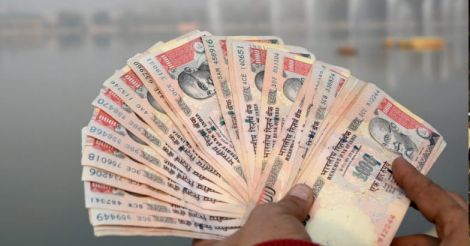After a successful visit to Nepal, Narendra Modi has to chose between principle and good diplomatic relations. Nepal's prime minister K P Singh Oli, who has a landslide victory like that of the Indian counterpart, has demanded that India should exchange the Rs.9,500 crores of demonetised Rs 500 and Rs 1,000 Indian notes, now stuck in the Nepalese banking system.
Nepal says the money, which has been accumulated in the country's banks, is the remittance made by Nepalese citizens and much of it is payment for labour done in India. But New Delhi for over 16 months has refused to accept these notes saying the deadline for their exchange has ended on December 30, 2016, and that these notes are illegal tender as per the changes made in the currency laws.
The locked-in money is a big number for the Nepalese economy and its citizens, and Oli had made an election promise that he would make India exchange this amount.
When Oli came to Delhi last month he had discussed with finance minister Arun Jaitley who had promised that a way would be found. But Modi, who has refused to entertain even the request of the Supreme Court to extend the deadline for surrendering the demonetised notes in Reserve Bank of India (RBI), had dragged his feet, saying the demonetisation was a closed chapter and cannot be opened. His attempts to dangle other carrots did not work as Oli was adamant. As Modi embarked on a charm mission, Oli has again made the stuck money as a bargaining point.
However, the Indian finance ministry, RBI and intelligence agency officials, who are advising Modi on this ticklish subject, have multiple objections to exchange the banned notes in Nepal. Firstly, they argue that the demonetisation effort was undertaken to end fake currency, which was printed in Pakistan but smuggled into India through Nepal. Thus they suspect that some part of the money in the Nepal banks can be fake. Second aim of demonetisation was to cripple the wealth of Indians who had stashed their money without paying income tax, and the suspicion is bulk of the money was smuggled to Nepal, and got deposited in banks. The officials say same modus operandi was used in India by rich people asking poor to deposit demonetised notes into their savings bank accounts. Third argument is that a smaller amount of demonetised notes are stuck in Bhutan, where the Indian rupee is freely used. If a scheme is made for Nepal, then it should be extended to Bhutan.
Final objection is a legal one. If demonetised currency held abroad can be legalised after the deadline was over, then the Supreme Court can rule that all Indians, who can explain the possession of these notes, should be given an opportunity to exchange the cancelled notes, as per the constitutional right of equality in law. But Modi had strongly resisted extending the window of opportunity for resident Indians and even for non-resident Indians, and exchanging them was difficult as it could be done only at the four RBI offices in Delhi, Mumbai, Chennai and Kolkata.
It is not just demonetised money, even legal money has led to protracted negotiations, especially when a country itself disappears. When the Soviet Union disintegrated into 15 countries in 1991, India owed lot of roubles to the dissolved country. Russia took over the assets and liabilities of USSR, and told India it should pay the huge amount not in roubles or rupees, but in dollars. This was a major challenge for new finance minister Manmohan Singh, who held many rounds of negotiations with the ex-communist nation. As India had severe shortage of dollars, Singh was advised by prime minister P V Narasimha Rao to offer goods like tea, handicrafts, cigarettes as payment to Russia. There were also huge disputes on the exchange value of the rouble, which was very strong during Soviet era, but had plunged after the disintegration. After more than a quarter century, the rouble mountain has subsided, and an economically more confident India is buying planes and warships from Russia paying in dollars. Russian companies are also investing big quantity of dollars as investment in India.
Modi is still trying to find an ingenuous way of solving the Nepalese demand, without compromising on demonetised currency elsewhere.

























